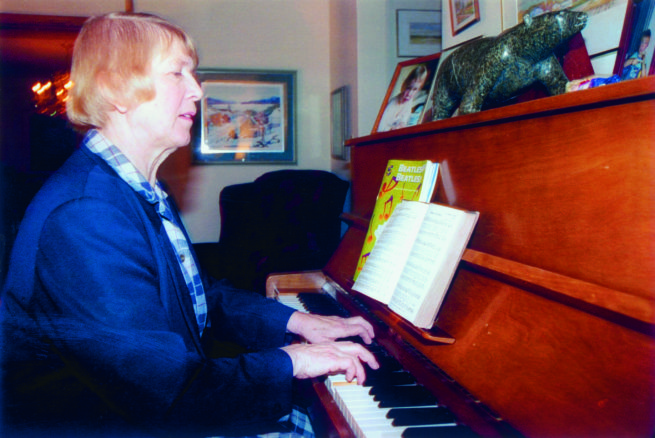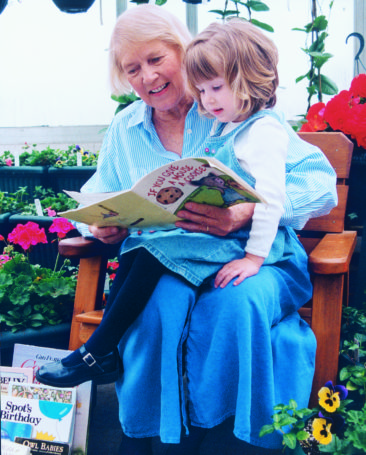October 1, 2018
Lois Hole’s legacy fund supports, in perpetuity, her love of kids, their education and the arts
“How does a child know they’re a ballerina?” asks Tracy Patience, executive director of Dickinsfield Amity House, a resource centre for low-income families. “We could have all these amazing ballerinas in our preschool that just don’t know, and will never get to know.”
So twice a month, the preschool at Amity House becomes a dance studio — or an art studio, drama room or drum circle. It just depends on who is leading Arts for Tots that day.
“We wanted them exposed to as many art forms as we could (give them),” says Patience.
In 2007, Arts for Tots was an early beneficiary of an Edmonton Community Foundation field of interest fund, created in memory of the late Lois Hole, Alberta’s beloved lieutenant-governor from 2000 to 2005. With such funds, donors identify the kinds of projects they want to support, but the Foundation selects the specific charities so that emerging needs can be met.
The Lois Hole Care and Nurture Legacy Fund fit perfectly, says Patience. “Lois Hole had a huge heart for children and also for supporting the arts. Our grant brought both of those things together.”

Edmonton Community Foundation granted Arts for Tots $46,800 over three years, including support from the Lois Hole fund. When the funding ended, Patience adjusted her budget so it could continue. For motivation, she recalled the magic of one little boy holding a drum for the first time.
“This little guy got this drum and was just so connected to it,” she says. “As soon as he got it, the head went back, the eyes closed and off he went.”
Patience likes to imagine that if Hole, a.k.a. the Queen of Hugs, could have attended a class, she would have done exactly the same thing. Hole was an ardent supporter of the arts, a tireless crusader for education and was passionate about growing things — crops and children alike. As a businesswoman, school trustee and lieutenant-governor, she took every opportunity to rally Albertans to embrace those causes.
Bill Hole recalls his mom played the piano, loved the opera and had CBC Radio playing 24/7 in the home. Themes of arts, literacy and education were woven into many of her speeches.
In creating a legacy fund, Bill and his brother Jim gave Albertans a way to honour their mom by supporting many institutions she cared about deeply, as they improve their community. Since it is structured as an endowment, the fund will carry on in perpetuity.
The fund shows how even the smallest donations can go a long, long way, says Bill Hole. “The general public made contributions, some as little as $10,” he says. “People may have forgotten that many years ago they made a contribution, (yet) it’s still working.”

For example, in October 2017, students drawn from elementary through high school “voted” in Alberta’s municipal elections. Their mock ballots didn’t count that day but will in the long run.
“They turn 18 and it’s, ‘Oh, I’ve voted before, I can do it again.’ That intimidation factor is gone,” says Lindsay Mazzucco, with the nonprofit organization CIVIX.
Thanks to a $47,000 grant that CIVIX received — supported in part by the Lois Hole fund — 2017 was the first year a student vote was held during an Alberta municipal campaign. The money supported 193 participating schools in Edmonton, helping with teacher guides, worksheets, posters, ballot boxes and voting screens.
The result? The students, just like their parents, voted in Don Iveson as mayor — and 18,000 young Edmontonians learned about democracy and civic duty.
“Teachers comment about how engaged the kids get in the elections,” Mazzucco says. “And the kids believe they know more about the election than their parents.”
In 2015, two Edmonton theatre companies received grants to expand existing student outreach programs that meld arts and education — projects Lois Hole would have embraced. Time and again, she chastised those who said arts are pleasant but non-essential.
On Theatre Prospero’s stage, Shakespeare’s Macbeth was reimagined, with help from Frog Lake First Nation students, into a Cree tragedy incorporating Indigenous language, Canadian history and an evil spirit named Wihtiko.
At Rapid Fire Theatre, the fast and funny world of improv theatre is teaching at-risk teens — those exposed to drugs, violence, law enforcement — to find positive ways to express themselves.
Theatre Prospero’s artistic director Mark Henderson saw the effect of performances of Pawâkan Macbeth on school groups in November 2017. “For some students, it was their introduction to anything to do with Cree culture, at all. And for some students it was their first introduction to anything to do with Macbeth, at all.”
For Karen Brown Fournell, general manager at Rapid Fire Theatre, the value is best measured by individual anecdotes of success: the street kid who went from an improv class, to theatre volunteering, to returning to school, to contemplating university. “It’s about saving each one of them. One at a time.”